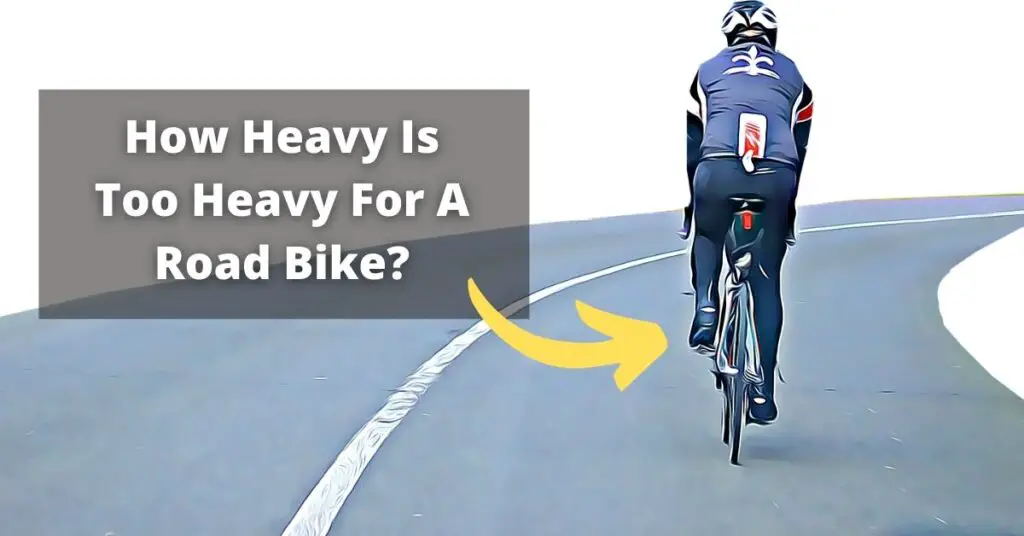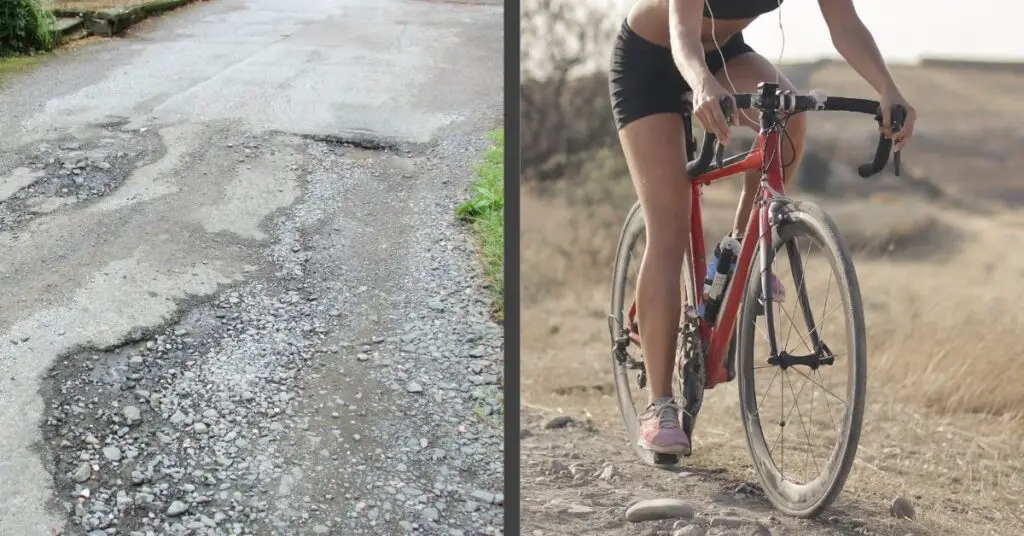Considering that riders differ widely in weight and size, heavy bikers often seek answers to questions like “What weight is considered Heavy when buying a Road Bike?” or How much weight can a Road bike hold considering I am a fat rider?”
Road bikes are of build quality and are made by different brands. These diversities cause variations in strength and durability.
Of course, road bikes have their limitations in weight that they can carry, the limitation is between 250 and 300 Ibs. However, there are bike manufacturers that produce bikes for heavy riders up to 500 Ibs, we’ll be looking into that in a bit.

How Heavy Is Too Heavy For A Road Bike?
Any Bike that’s over 16-17 pounds in weight will be considered as a heavier bike. However, this does not mean that a lighter bike will make you significantly improve your abilities.
Typical bikes weigh around 22 lbs. This weight is without a saddlebag, drinking water, etc.
Are You Planning for a Road Competition? UCI’s minimum weight limit is 6.8kg.
Cost comparisons
| Price Range | Average Weight |
| Less than $600 | 600 – 1200 lbs |
| $600 – $1200 | 25 lbs |
| More than $1200 – $1300 | Less than 21 lbs |
| $ 1700 – $ 1800 & above | 18 lbs or less |
Aluminum vs. Steel
Steel is a bit heavier than Aluminum but it is also flexible which eases your ride by soaking up all the bumps and rough roads. This means you feel less tired on long distances. Two bikes of the same weight but of different materials will behave differently.
Do I really need a Lighter Bike?
The truth is that a Pro level Road bike and a bike intended for a beginner will usually have a difference of about 3-4 kgs.
If you are a beginner, you do not need to worry about this much.
If you are a pro cyclist and at the pinnacle of your cycling skills, the difference will matter.
What’s really important is how the bike fits you, Whether you feel the frame to be griping the pavement tight enough and not loosely moving, and how the components function.
Problems with a Heavy Road Bike
1- Heavier Bikes May Compromise on Quality
A heavy bike that is not specifically built for heavy loads and riding on bad terrains will usually be made with low-quality components. This is a bigger problem than the weight of the bike itself as it can lead to cracks, damages, and faulty bike functions.
While they can be cheap chances are that they will be made of inferior-grade aluminum, and all the bike components around the frame may be poor quality heavy alloy.
2- Fight the Uphill Battle
While going uphill you will feel the need to have a lighter road bike. Despite the improvements in your cycling abilities over the years, you will notice that for climbing purposes, a lighter bike does not make much difference.
3- Speed
Depending upon the road, a heavier road bike will slow you down by about 10%-15%.
4- Energy Sucking
Every time you have to stop at city lights or to give way, you might feel the frustration to get it going again. Getting it up the stairs, walkups, or other places with narrow stairs will take a toll on you.
Benefits of a Lighter Road Bike
1- It is much easier to get over the bridges and up small climbs.
2- A lighter bike will usually get to speed slightly faster than a heavier one.
Tips
1- The amount of money spent in acquiring a lighter bike (3-4 pounds) will not be as beneficial as losing that much weight which will save you money and be good for your health.
2- If you are looking for more speed, consider tight jerseys and bibs.
3- Carry only the essentials and try to keep the overall weight of the bike down.
4- Use heavier bikes for training purposes as you need resistance there to get stronger.
5- Some tires are heavier but are more durable and can handle terrains well than other lighter ones. When trying to upgrade, you should have your priorities straight.
6- Disk brakes are especially beneficial on wet roads but add more weight to the bike. So consider this factor when planning to go for these brake types.
Road Bike Weight FAQs
Here are quite frequently asked questions
| Common Questions | Answers |
| Is 9kg (19.84 lbs) heavy for a road bike? | This weight is slightly out of the range of what is considered “Relatively Lighter Bikes – Under 17 lbs”You will certainly notice a difference between let’s say a 7 kg bike and a 9 kg bike when climbing. |
| Is 10kg (22.05 lbs) heavy for a road bike? | This is a typical road bike weight. As this is over 17 lbs, many people will consider it to be heavy. |
| Is 11kg (24.25 lbs) heavy for a road bike? | 11 Kg is considered heavy in the biker’s community. Do not forget about the water, pump, multitool, lights, spare tubes, GPS, food, etc. when accounting for the overall weight of the bike. |
| Is 12kg (26.46lbs) heavy for a road bike? | This weight is Heavy for a Road Bike. You must account for the water, pump, multitool, lights, spare tubes, GPS, food, etc. when calculating the weight of the bike. |
Rather than the weight itself, a better drivetrain and gear range will make your climbs easier and also increase your speed on flat terrain as well as while going downhill.
To compensate for some extra weight and climb easily, you may consider changing the cassette from let’s say, 11-32 to 11-28.
Am I Too Heavy for My Road Bike?
Generally, 250-300 pounds should not be a problem for a Road Bike. It is quite important to keep the tires inflated properly. If the tires are getting squished, then it means that they aren’t inflated to the required level.
People usually feel nervous that they might break their bike frame or wheels when they’re riding outside and pedaling hard.
Ride Smartly!
1- Try to ride as light as possible as you already are overweight.
2-Try not to rock your bike from side to side while sprinting but keep it near vertical. This will help your wheels to take the load evenly.
3- When going over bumps and potholes, try standing on your pedals and let your knees (instead of the frame and tires) absorb the shock.
Wheels Are the Ones That Matter!
If you are going beyond 250 pounds, you can consider installing wider tires such as 25 or 28. This will reduce impact punctures.
A 36 spoke wheel will be in a confident position to handle overweight riders. You can try replacing your current wheels with 32-36 spoked ones.
Conclusion
Whether you should go for a lighter bike or not is purely dependant upon your level of expertise in cycling, your budget, and your needs.
Although a lighter bike won’t make a world of difference if you are a beginner, it may do some good if you are a pro.
Cheers!




